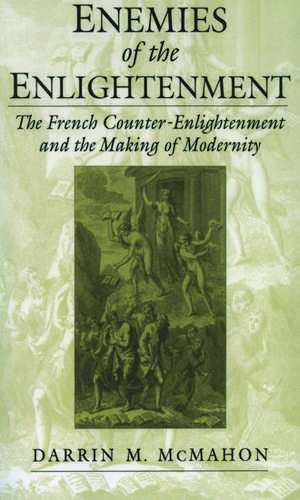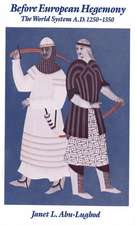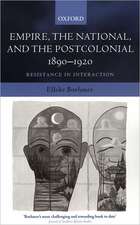Enemies of the Enlightenment: The French Counter-Enlightenment and the Making of Modernity
Darrin M. McMahonen Limba Engleză Paperback – 26 sep 2002
Preț: 222.57 lei
Nou
Puncte Express: 334
Preț estimativ în valută:
42.59€ • 44.00$ • 35.45£
42.59€ • 44.00$ • 35.45£
Carte tipărită la comandă
Livrare economică 14-20 martie
Preluare comenzi: 021 569.72.76
Specificații
ISBN-13: 9780195158939
ISBN-10: 0195158938
Pagini: 288
Ilustrații: numerous halftones
Dimensiuni: 234 x 156 x 16 mm
Greutate: 0.41 kg
Ediția:Revised
Editura: Oxford University Press
Colecția OUP USA
Locul publicării:New York, United States
ISBN-10: 0195158938
Pagini: 288
Ilustrații: numerous halftones
Dimensiuni: 234 x 156 x 16 mm
Greutate: 0.41 kg
Ediția:Revised
Editura: Oxford University Press
Colecția OUP USA
Locul publicării:New York, United States
Recenzii
McMahon is to be commended both for drawing his readers' attention to a neglected political movement and discourse and for offering a provocative reading of the period that should elicit much response. This book will undoubtedly permanently affect the way we think about and teach the era of the French Revolution and its aftermath.
In a consistently even-handed and lucid manner, McMahon details the evolution of a vital strain of modern thought with roots in the age of Enlightenment, one that Keith Baker and other historians of political discourse have largely ignored.
... sophisticated and vividly written.
His [McMahon's] book is well grounded on solid research in French archives, and it is remarkably well written. It takes the Enlightenment out of the salons.
Thoughtful and well-written.
Enemies of the Enlightenment presents a useful genealogy of a brand of conservatism that remained influential through the mid-20th century, and, more pressingly, a rough template for a host of counter-Enlightenment ideas that are with us still today, from Cambridge to Kabul.
McMahon's argument is deeply versed in recent scholarship; his prose is polished, and the book is illustrated with compelling examples of visual propaganda.
In a consistently even-handed and lucid manner, McMahon details the evolution of a vital strain of modern thought with roots in the age of Enlightenment, one that Keith Baker and other historians of political discourse have largely ignored.
... sophisticated and vividly written.
His [McMahon's] book is well grounded on solid research in French archives, and it is remarkably well written. It takes the Enlightenment out of the salons.
Thoughtful and well-written.
Enemies of the Enlightenment presents a useful genealogy of a brand of conservatism that remained influential through the mid-20th century, and, more pressingly, a rough template for a host of counter-Enlightenment ideas that are with us still today, from Cambridge to Kabul.
McMahon's argument is deeply versed in recent scholarship; his prose is polished, and the book is illustrated with compelling examples of visual propaganda.












